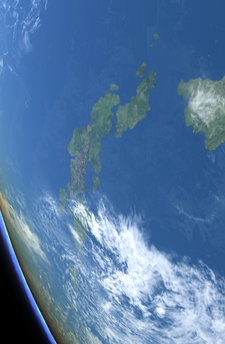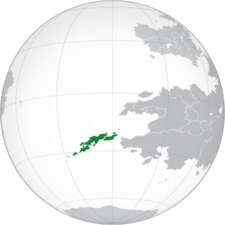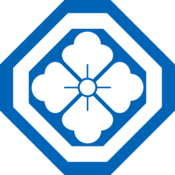Senrian archipelago: Difference between revisions
mNo edit summary |
mNo edit summary |
||
| (3 intermediate revisions by the same user not shown) | |||
| Line 1: | Line 1: | ||
{{Region icon Kylaris}} | {{Region icon Kylaris}} | ||
{{WIP}} | {{WIP}} | ||
{{Infobox islands | |||
|name = Senrian Archipelago | |||
|local_name = {{collapsible list | |||
|titlestyle = background:transparent; text-align:center; font-size:9pt; | |||
|liststyle = text-align:center; | |||
|title = Native names | |||
|1 = 썬류우렅또우 ({{wp|Japanese language|Senrian}}) | |||
|2 = シンルーヌシマ ({{wp|Ryukyuan languages|Isotaman}}) | |||
|3 = シㇴルィモシㇼ ({{wp|Ainu language|Esamankur}}) | |||
|4 = ''Sanlux malꜧuř'' ({{wp|Nivkh languages|Cotratic}}) | |||
}} | |||
|image_name = Satellite image of the Senrian archipelago.png | |||
|image_size = 225 | |||
|image_caption = A 2010 satellite photograph of the Senrian archipelago and the western [[Kaoming Peninsula]] | |||
|image_alt = | |||
|map_image = Senria orthographic projection.png | |||
|map_size = 225 | |||
|location = [[Coius|Southwestern Coius]] | |||
|coordinates = | |||
|waterbody = [[Lumine Ocean]]<br>[[Honghai Sea]]<br>[[Bay of Bashurat]] | |||
|area_km2 = 589191.68 | |||
|area_footnotes = | |||
|length_km = 2554.30 | |||
|length_footnotes = | |||
|width_km = 460.54 | |||
|width_footnotes = | |||
|total_islands = 12,000+ | |||
|major_islands = [[Kousuu]]<br>[[Tousuu]]<br>[[Yuusuu]]<br>[[Gyousuu]] | |||
|highest_mount = {{nowrap|[[Mount Senzou]]}} | |||
|elevation_m = 3776 | |||
|population = 258,688,489 | |||
|population_as_of = 2015 | |||
|population_footnotes = | |||
|density_km2 = 439.06 | |||
|country = {{flag|Senria}} | |||
|country_capital_and_largest_city = {{flagicon image|Flag of Kyoto City.svg}} [[Keisi]] | |||
|country_largest_city_population = 20,862,000 | |||
|country_leader_title = [[Prime Minister of Senria|Prime Minister]] | |||
|country_leader_name = [[Akiko Hasegawa]] | |||
|languages = {{wp|Japanese language|Senrian}}, {{wp|Ryukyuan languages|Isotaman}}, {{wp|Ainu language|Esamankur}}, {{wp|Nivkh languages|Cotratic}} | |||
|timezone1 = | |||
|utc_offset1 = | |||
|timezone1_DST = | |||
|utc_offset1_DST = | |||
|additional_info = | |||
|footnotes = | |||
}} | |||
The '''Senrian archipelago''' ({{wp|Japanese language|Senrian}}: {{lang|ko-Hang-KR|썬류우렅또우}}, ''Senryuu-rettou'', {{wp|Kanji|Gyoumon}}: {{lang|ja|千竜列島}}; {{wp|Ryukyuan languages|Isotaman}}: {{lang|ja|シンルーヌシマ}}, ''Shinruu-nushima''; {{wp|Ainu language|Esamankur}}: {{lang|ja|シㇴルィモシㇼ}}, ''Sinruy mosir''; {{wp|Nivkh languages|Cotratic}}: ''Sanlux malꜧuř'') is a {{wp|stratovolcano|stratovolcanic}} {{wp|archipelago}} consisting of more than 12,000 islands located off the southwestern coast of [[Coius]], bordered by the [[Lumine Ocean]] to the west and north, the [[Bay of Bashurat]] to the northeast, the [[Rangyoku Strait]] to the east, and the [[Honghai Sea]] to the south and southeast. The archipelago spans roughly 2,554 kilometers (1,587 miles) from east to west, but is only about 460 kilometers (285 miles) wide from north to south at its widest point. | The '''Senrian archipelago''' ({{wp|Japanese language|Senrian}}: {{lang|ko-Hang-KR|썬류우렅또우}}, ''Senryuu-rettou'', {{wp|Kanji|Gyoumon}}: {{lang|ja|千竜列島}}; {{wp|Ryukyuan languages|Isotaman}}: {{lang|ja|シンルーヌシマ}}, ''Shinruu-nushima''; {{wp|Ainu language|Esamankur}}: {{lang|ja|シㇴルィモシㇼ}}, ''Sinruy mosir''; {{wp|Nivkh languages|Cotratic}}: ''Sanlux malꜧuř'') is a {{wp|stratovolcano|stratovolcanic}} {{wp|archipelago}} consisting of more than 12,000 islands located off the southwestern coast of [[Coius]], bordered by the [[Lumine Ocean]] to the west and north, the [[Bay of Bashurat]] to the northeast, the [[Rangyoku Strait]] to the east, and the [[Honghai Sea]] to the south and southeast. The archipelago spans roughly 2,554 kilometers (1,587 miles) from east to west, but is only about 460 kilometers (285 miles) wide from north to south at its widest point. | ||
| Line 11: | Line 59: | ||
==Etymology and terminology== | ==Etymology and terminology== | ||
[senrian ''senryuu-rettou'' and isotaman ''shinruu-nushima'', both 千竜列島, both backformations from ''senryuukoku'' and therefore have the same etymology about pairyuu and toyomike and whatnot as "senria"] [the senrian government | [senrian ''senryuu-rettou'' and isotaman ''shinruu-nushima'', both 千竜列島, both backformations from ''senryuukoku'' and therefore have the same etymology about pairyuu and toyomike and whatnot as "senria"] [the senrian government also established official names in esamankur, ''sinruy mosir'', and cotratic, ''sanlux malꜧuř'', which similarly literally just mean "Senrian archipelago", after the official senrian policy towards these languages softened from "stop speaking them" to "ok fine you can speak them but no having a separate identity" in the 20th century] | ||
[esamankur has two indigenous names for the archipelago, ''porohumbe mosir'' ("great whale land") and ''tannekamuy mosir'' ("snake - lit. long god - land"). the former is pretty well-established as emerging from creation myth, in which a {{wp|Japanese wagtail|wagtail}} called a great whale to the surface of the ocean to form the archipelago. the latter is contentious because of debates about when it emerged and what it's meant to mean - did it emerge comparatively late, an esamankur effort to calque the name "senria" and the idea of a dragon into their language predating the 1900s imposition of ''sinruy''? or did it emerge much earlier, predating the arrival of proto-senrians in the archipelago entirely, suggesting that senria's mythic origins are in fact something they took from the esamankur? or is it simply comparing the long and narrow archipelago to a serpent?] | [esamankur has two indigenous names for the archipelago, ''porohumbe mosir'' ("great whale land") and ''tannekamuy mosir'' ("snake - lit. long god - land"). the former is pretty well-established as emerging from creation myth, in which a {{wp|Japanese wagtail|wagtail}} called a great whale to the surface of the ocean to form the archipelago. the latter is contentious because of debates about when it emerged and what it's meant to mean - did it emerge comparatively late, an esamankur effort to calque the name "senria" and the idea of a dragon into their language predating the 1900s imposition of ''sinruy''? or did it emerge much earlier, predating the arrival of proto-senrians in the archipelago entirely, suggesting that senria's mythic origins are in fact something they took from the esamankur? or is it simply comparing the long and narrow archipelago to a serpent?] | ||
| Line 17: | Line 65: | ||
[the traditional nivkh name was the rather uninspiring ''aꜧř uř'', literally just "the nearby islands"] | [the traditional nivkh name was the rather uninspiring ''aꜧř uř'', literally just "the nearby islands"] | ||
[poetically | [poetically called "the land of the setting sun" in both senrian and foreign-language texts, probably ad nauseam; ] | ||
[terminology - sometimes called "mainland senria" or "senria proper" to distinguish it from the [[Sunahama Islands]] and any other outlying bits of rock senria claims] | [terminology - sometimes called "mainland senria" or "senria proper" or "metropolitan senria" to distinguish it from the [[Sunahama Islands]] and any other outlying bits of rock senria claims] | ||
==Geography== | ==Geography== | ||
| Line 31: | Line 79: | ||
[isotamas - narazima and the near isotamas, iezima kumezima and the far isotamas] | [isotamas - narazima and the near isotamas, iezima kumezima and the far isotamas] | ||
[hibotus -yorosima kurosima etc] | [hibotus - yorosima kurosima etc] | ||
==Climate and environment== | ==Climate and environment== | ||
| Line 40: | Line 88: | ||
{{Template:Senria topics}} | {{Template:Senria topics}} | ||
[[Category:Senria]] | [[Category:Senria]][[Category:Geography (Kylaris)]] | ||
Latest revision as of 17:20, 14 January 2024
This article is incomplete because it is pending further input from participants, or it is a work-in-progress by one author. Please comment on this article's talk page to share your input, comments and questions. Note: To contribute to this article, you may need to seek help from the author(s) of this page. |
 A 2010 satellite photograph of the Senrian archipelago and the western Kaoming Peninsula | |
 | |
| Geography | |
| Location | Southwestern Coius |
| Adjacent bodies of water | Lumine Ocean Honghai Sea Bay of Bashurat |
| Total islands | 12,000+ |
| Major islands | Kousuu Tousuu Yuusuu Gyousuu |
| Area | 589,191.68 km2 (227,488.18 sq mi) |
| Length | 2,554.30 km (1,587.168 mi) |
| Width | 460.54 km (286.166 mi) |
| Highest elevation | 3,776 m (12,388 ft) |
| Highest point | Mount Senzou |
| Administration | |
| Capital and largest city | |
| Prime Minister | Akiko Hasegawa |
| Demographics | |
| Population | 258,688,489 (2015) |
| Pop. density | 439.06 /km2 (1,137.16 /sq mi) |
| Languages | Senrian, Isotaman, Esamankur, Cotratic |
The Senrian archipelago (Senrian: 썬류우렅또우, Senryuu-rettou, Gyoumon: 千竜列島; Isotaman: シンルーヌシマ, Shinruu-nushima; Esamankur: シㇴルィモシㇼ, Sinruy mosir; Cotratic: Sanlux malꜧuř) is a stratovolcanic archipelago consisting of more than 12,000 islands located off the southwestern coast of Coius, bordered by the Lumine Ocean to the west and north, the Bay of Bashurat to the northeast, the Rangyoku Strait to the east, and the Honghai Sea to the south and southeast. The archipelago spans roughly 2,554 kilometers (1,587 miles) from east to west, but is only about 460 kilometers (285 miles) wide from north to south at its widest point.
[paleogeography, geology]
[paleohistory and history]
The main portion of the Republic of Senria spans the entirety of the archipelago. [politics and contemporary stuff]
Etymology and terminology
[senrian senryuu-rettou and isotaman shinruu-nushima, both 千竜列島, both backformations from senryuukoku and therefore have the same etymology about pairyuu and toyomike and whatnot as "senria"] [the senrian government also established official names in esamankur, sinruy mosir, and cotratic, sanlux malꜧuř, which similarly literally just mean "Senrian archipelago", after the official senrian policy towards these languages softened from "stop speaking them" to "ok fine you can speak them but no having a separate identity" in the 20th century]
[esamankur has two indigenous names for the archipelago, porohumbe mosir ("great whale land") and tannekamuy mosir ("snake - lit. long god - land"). the former is pretty well-established as emerging from creation myth, in which a wagtail called a great whale to the surface of the ocean to form the archipelago. the latter is contentious because of debates about when it emerged and what it's meant to mean - did it emerge comparatively late, an esamankur effort to calque the name "senria" and the idea of a dragon into their language predating the 1900s imposition of sinruy? or did it emerge much earlier, predating the arrival of proto-senrians in the archipelago entirely, suggesting that senria's mythic origins are in fact something they took from the esamankur? or is it simply comparing the long and narrow archipelago to a serpent?]
[the traditional nivkh name was the rather uninspiring aꜧř uř, literally just "the nearby islands"]
[poetically called "the land of the setting sun" in both senrian and foreign-language texts, probably ad nauseam; ]
[terminology - sometimes called "mainland senria" or "senria proper" or "metropolitan senria" to distinguish it from the Sunahama Islands and any other outlying bits of rock senria claims]
Geography
[four "main islands" - from largest to smallest, kousuu, tousuu, yuusuu, gyousuu]
[three larger "small islands" which lie off of the main islands (primarily kousuu, but rousima's kinda also off of yuusuu) - kisima, kanasima, rousima]
[yet smaller outlying "small islands" - sugisima, kaedezima, that one between kousuu and tousuu i've yet to name, a great many others ICly]
[isotamas - narazima and the near isotamas, iezima kumezima and the far isotamas]
[hibotus - yorosima kurosima etc]
